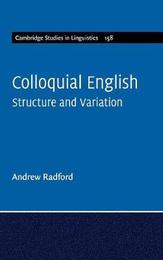
|
Colloquial English: Structure and Variation
Hardback
Main Details
| Title |
Colloquial English: Structure and Variation
|
| Authors and Contributors |
By (author) Andrew Radford
|
| Series | Cambridge Studies in Linguistics |
|---|
| Physical Properties |
| Format:Hardback | | Pages:344 | | Dimensions(mm): Height 235,Width 156 |
|
| Category/Genre | Usage and grammar guides
Sociolinguistics
Grammar and syntax |
|---|
| ISBN/Barcode |
9781108428057
|
| Classifications | Dewey:418 |
|---|
| Audience | | Professional & Vocational | |
|---|
| Illustrations |
Worked examples or Exercises
|
|
Publishing Details |
| Publisher |
Cambridge University Press
|
| Imprint |
Cambridge University Press
|
| Publication Date |
14 June 2018 |
| Publication Country |
United Kingdom
|
Description
Drawing on vast amounts of new data from live, unscripted radio and TV broadcasts, and the internet, this is a brilliant and original analysis of colloquial English, revealing unusual and largely unreported types of clause structure. Andrew Radford debunks the myth that colloquial English has a substandard, simplified grammar, and shows that it has a coherent and complex structure of its own. The book develops a theoretically sophisticated account of structure and variation in colloquial English, advancing an area that has been previously investigated from other perspectives, such as corpus linguistics or conversational analysis, but never before in such detail from a formal syntactic viewpoint.
Author Biography
Andrew Radford is Emeritus Professor at the University of Essex. He has written nine books on syntactic theory and English syntax, including Syntactic Theory and the Structure of English (Cambridge, 1997), Minimalist Syntax (Cambridge, 2004) and Analysing English Sentences (Cambridge, 2016).
Reviews'Lucid, magisterial, encyclopaedic; it covers a huge amount of material and makes sense of horrendously complex data.' Neil Smith, University College London 'Radford demonstrates convincingly that colloquial English is as theoretically interesting and descriptively challenging as standard English. Expressing yourself informally does not exempt you from the constraints of Universal grammar.' Jan Terje Faarlund, University of Oslo
|